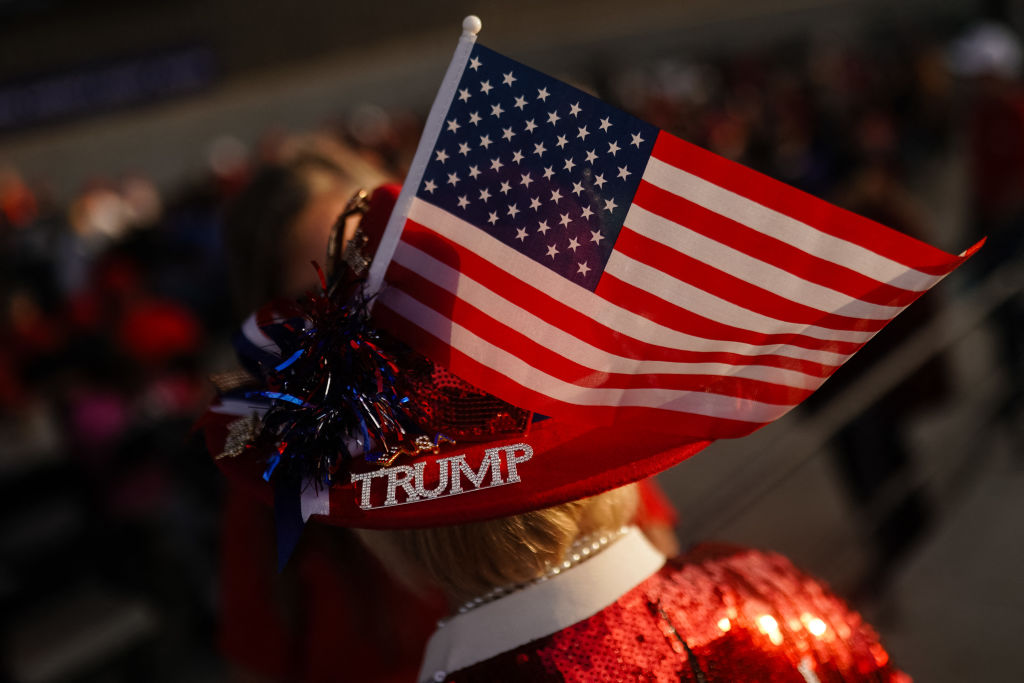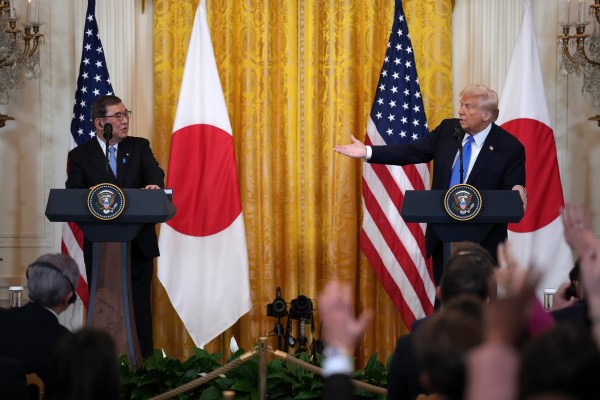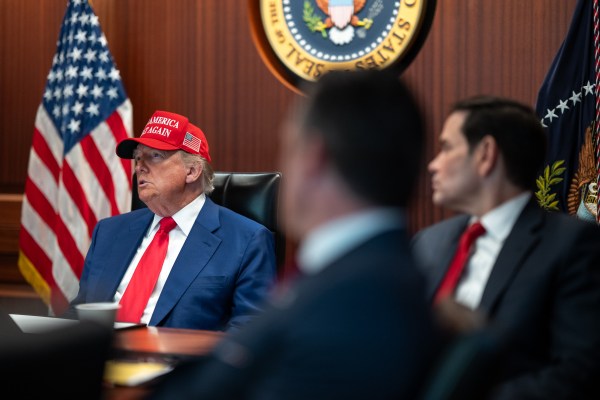Christopher Scalia is a fellow at the American Enterprise Institute and son of the late Supreme Court justice. His Reaganite credentials are impeccable, in other words, so you can imagine how disorienting the past month has been for him.
“You’re not a real conservative this week unless you support [Robert F. Kennedy] Jr., Tulsi Gabbard, and Eric Adams,” he quipped on Friday.
A few hours later a twentysomething MAGA social media influencer tweeted that she’d given birth last year to a baby fathered by Elon Musk. If true, that’s the 13th child by four different women for the second-most powerful man in the Republican Party. “I am very confused about what conservative cultural and moral values are supposed to be at the moment,” journalist Michael Tracey observed of Elon’s tireless effort to single-handedly reverse America’s population decline.
I was also confused. Why are Tracey and Scalia under the impression that the Trumpist right purports to be “conservative”?
Our actual president and our shadow president have each explicitly disclaimed the label in the past. It doesn’t seem to have much intellectual content among right-wing activists anymore either, assuming it ever did. Mostly you see it deployed atavistically as a cudgel against skeptics of whatever Donald Trump’s latest ridiculous folly might be: If you don’t support $7.5 trillion in new deficits you’re not a conservative.
The modern Republican Party isn’t conservative in any meaningful way. Any lingering doubt about that was extinguished on Saturday.
“He who saves his Country does not violate any Law,” Trump declared in a post. It’s not clear where he got that line—some attributed it to Napoleon, apocryphally—but it must be the most overtly fascist thing a U.S. president has ever said. Even so, the official White House Twitter account excitedly promoted the post alongside a photo of Trump’s weird, glowering official portrait. Right-wing influencers celebrated it too, including Shadow President Musk, with some leaning very hard indeed into the Bonaparte analogy.
These people aren’t “conservatives.” They’re not pretending to be conservatives. They’re fascists, and the lengths to which they’re willing to go to implement a fascist agenda will become clearer every hour of every day of the next four years. Trying to shame them into behaving better by holding them to the standards of conservatism will not work. If Trump’s brand of politics stands for anything, it’s the proposition that shame is evidence of weakness and weakness is the only thing stopping you from subduing everyone in your way.
Is there a way to remain patriotic in a country governed by fascists?
The content of patriotism.
I detest nationalists but I appreciate that their sense of patriotism has ideological substance.
They get a bad rap on that point, in fact. Many would caricature nationalists’ notion of patriotism as “my country, right or wrong” but that’s the opposite of true. Have you ever heard Donald Trump sound patriotic when he believes America is doing wrong—i.e., when it’s being governed by someone other than him?
No one trash-talks their own country as ecstatically as a nationalist who’s out of power. To find another cohort as quick to blame the United States for the world’s problems, you need to venture out into the woolly Code Pink fringes of the American left.
Still, and with apologies to Walter Sobchak: Say what you want about the tenets of postliberalism, at least it’s an ethos. Nationalists recognize, reasonably enough, that pride in one’s country should depend on what that country actually stands for. If it’s unconditional, if “my country, right or wrong” is your motto, all you’re doing is rooting for laundry.
“Rooting for laundry” comes from an old Jerry Seinfeld bit about the silliness of sports fandom. We go to the game and cheer boisterously for the players on our team, he noted; then some get traded away, eventually return to town as members of the visiting team, and we boo them lavishly. There’s no substance to our emotions in either case apart from blind loyalty to the home team. What we’re actually cheering for is that team’s uniform—for laundry.
Republican voters have been rooting for laundry since 2015. Most of the “players” have been traded away or retired over the past decade, replaced with ones who openly disdain the postwar liberal order that the GOP defended for 70 years. It didn’t matter: The fans kept going to the games and cheering for the red uniform. Now we have a “conservative” party that’s functionally fascist, earning the same dependable 49 percent or so of the vote in every election.
Rooting for laundry in politics amounts to unconditional support for a political project no matter how malevolent it gets. That political project is now directing the United States government, not just the Republican Party. Our friend Bill Kristol considered the implications in a post at The Bulwark on Tuesday:
What happens when we can no longer be proud of the behavior of our own government and its leaders? How are we to react when bigotry is given sanction, when lying is routine, when corruption is rampant, when public-spirited officials are forced to resign?
There have been plenty of presidents with whom many of us have disagreed. There have been many administrations whose policies we have disapproved of. But there’s been nothing, at least in my experience, that’s challenged our basic pride in our own government until now.
…
We love our country in large part because it is a free country. We oppose the actions of the current administration because we want this nation to remain a free country and once again to become a friend of freedom abroad. We oppose the current administration not because we’re ashamed of America but because we’re proud of America.
We’ll come back to that last point, but certainly Kristol is right that the Trump administration will test conservatives’ sense of patriotism in unique ways. Every American knows what it’s like to be governed by a regime whose agenda is foolish and whose ambitions are hubristic. What’s new is being governed by a regime whose intentions are, transparently, malign.
Leaning into villainy.
Case in point: News broke this weekend that the White House is leaning on Romania’s government to lift travel restrictions on Andrew and Tristan Tate.
The Tate brothers are “manosphere” influencers with a following on the American right, and no wonder. Andrew preaches remorseless dominance, particularly over women, and relishes flaunting his wealth; he’s a younger, surlier Donald Trump, essentially, just as immoral and twice as boorish. Unsurprisingly, and also like Trump, his degeneracy has landed him in criminal trouble: He and his brother are facing charges in Romania related to human trafficking, sexual misconduct, money laundering, and organized crime.
Evil stuff. Yet not only have Trump’s deputies gone to bat for the Tates, they’ve done so surely realizing that if the two are allowed to leave Romania, they’ll never return to face the consequences. Pressuring Bucharest to let them flee is as close as the White House can get to issuing the two a presidential pardon for human trafficking.
I mention all of this not because the Tates are important but because they aren’t. Abetting their case for freedom is a gratuitous display of villainy by the president on behalf of two other villains. Trump gains nothing from it and might potentially sustain a political black eye from the media coverage. The only reason to intervene on the Tates’ behalf is because he’s keen to show—and not for the first time—that personal allegiance to him is the only salient moral consideration when exercising his executive discretion, especially when the beneficiary has demonstrated the sort of personal ruthlessness that he admires as evidence of “strength.”
If the Tates are too picayune an example of malign intent, consider the sellout of Ukraine that’s now underway.
On Monday the Telegraph revealed a draft of the deal that U.S. officials offered to Volodymyr Zelensky last week as a condition of continued American support. Asking Ukraine to repay the United States for some of the aid it’s received isn’t unreasonable, never mind that some of that aid was already in the form of lend-lease and much of it was directed to American weapons manufacturers, not to Kyiv. For an administration that sees no value in protecting Western liberalism from Russian aggression, backing Ukraine will require a more bottom-line incentive.
The problem, per the Telegraph, is that the terms offered to Zelensky were tantamount to loan-sharking. In return for the $175 billion in support we’ve given, the White House is demanding the equivalent of $500 billion in mineral rights, access to ports, control over infrastructure—the “U.S. economic colonization of Ukraine, in legal perpetuity,” in short. Author Ambrose Evans-Pritchard called it “a burden of reparations that cannot possibly be achieved” and compared it unfavorably to the penalties paid by the Axis powers after World War II and even to the notoriously draconian burden placed on Germany after World War I.
Using Ukraine’s fight for national survival as a pretext for an unprecedented shakedown is cartoonish villainy, like withholding an organ transplant from a dying man until he signs his children into slavery. But Trump isn’t letting up: On Tuesday Fox News reported that the U.S. and Russia will propose a three-step peace process requiring a new presidential election in Ukraine, an obvious ploy to unseat Zelensky and have him replaced with a Russian stooge who’ll capitulate to Moscow.
Needless to say, Donald “Stop the Steal” Trump and Vladimir “87 Percent” Putin cannot and should not be trusted not to meddle in that election in various ways to try to see Zelensky defeated. In the annals of American villainy, informally collaborating with the Kremlin to oust a hero of Western democracy would be a showstopper, only to be topped later perhaps by a Munich-style pact in which Putin makes sure that America gets those Ukrainian mineral rights it desired after all.
The demoralization agenda.
Everywhere you look over the past month, you’ll find villainy that barely purports to be in the public interest.
Allies are being threatened for territorial concessions and alienated to no obvious end. America’s best federal prosecutors are quitting day by day rather than carry out the sleazy vendettas and quid pro quos demanded by the White House. Programs are being canceled and workers being fired in a manner so wanton that it resembles revolutionaries smashing up a palace more so than bean-counters thoughtfully searching for wasteful spending. On Thursday night, members of the team that manages America’s nuclear weapons were suddenly fired—and then hurriedly rehired once word reached the press.
The callousness and demagoguery with which all of it has been carried out is also unabashedly villainous even by Trumpist standards, per the Napoleon quote I mentioned earlier. One White House adviser grumbled to the Washington Post that the media has been unfair to Elon Musk and his team because it insists on covering “the one starving kid in Sudan that isn’t going to have a USAID bottle.” Musk himself, who promoted his acquisition of Twitter as a triumph for free speech, now calls for reporters to be imprisoned and routinely hypes discoveries of “fraud” by his deputies at federal agencies that turn out to be no such thing.
Meanwhile, Democrats have begun wargaming their response if—when?—Trump satisfies his Napoleon complex by eventually defying a Supreme Court ruling. Even so, Senate Republicans will soon meekly confirm a notorious Trump henchman with an ideological enemies list to lead the FBI.
That’s a lot of villainy. Yet, per New York Times columnist David Brooks, none of it is geared toward any obvious populist policy end or “greater good” that might plausibly redeem the chaos. Trump “seems to have no plans to narrow the education chasms, no plans to narrow the health outcome chasms or the family structure chasms” that bedevil the working class, he writes. “The essence of Trumpism [is] to be blithely unconcerned that people without a college degree die about eight years sooner or that hundreds of thousands of Africans might now die of AIDS but to go into paroxysms of moral panic because of who competes in a high school girls’ swim meet.”
We’ve had many presidents who tried earnestly to advance the national interest but in reckless and destructive ways, believing for instance that replacing Saddam Hussein with a democratic Iraqi government might liberalize the Middle East or that negotiating with Iran might convince that regime to forfeit its nuclear program and renounce expansionism. What we haven’t had since America’s emergence as leader of the free world is a president who disclaims what that role logically requires of him, at home and abroad. Trump’s highest priorities, plainly, are to divert as much federal authority as possible to the presidency, to ensure that he and his deputies operate with no accountability, and to normalize intimidation as an ethic of American domestic and international politics.
“Fear is the common denominator in all of this—palpable, paralyzing, and quite justifiable fear,” sociologist Larry Diamond wrote on Monday. “Fear now stalks the land. This is the most visceral indication that America has entered an existential era for the future of democracy.” Cultivating fear as a political tool is a hallmark of the world’s most sinister regimes and a new experience for America, certainly since World War II. But you knew that already.
Patriotism lost?
The effect of all this, if not the intent, is to demoralize anyone whose sense of patriotism is informed by respect for the constitutional scheme and a belief in American exceptionalism. The nationalist notion of patriotism isn’t informed by either, which is a big part of why nationalists are so despicable. In the name of American greatness, they wish for the world’s most powerful country to operate like some backwater basket case with “-stan” at the end of its name.
But they’re in charge now, and will remain in charge for another four years. The villainy we’ve witnessed so far is just a whiff of what’s to come. And so I ask you, dear reader: How should you feel about America if your patriotism is more considered than wearing one of those “Back-to-back undefeated world war champs” T-shirts? What degree of respect is owed to the stars and stripes when they stop representing liberal democracy and start representing a world view that treats Canada with more hostility than Russia?
We’re going to have a big national 250th birthday celebration next July. If we’ve already endured a constitutional crisis or two, or 10, by then, and the president has successfully reduced the other branches of government to servile nullities, will you attend your local parade to dutifully salute the laundry on the flagpole?
America is more than its government, you might say, and that’s true. That was Bill Kristol’s point, I take it, when he wrote, “We oppose the current administration not because we’re ashamed of America but because we’re proud of America.” You can hate the president and his deputies and his ideological project while loving the country and the ideals on which its founded. America is more than its government.
Is it more than its people?
Whether America still deserves my patriotism depends on how Americans react to that constitutional crisis or two, or 10, that’s coming. If they side decisively with the constitutional order then America is still, more or less, America. If they’re ambivalent or they side with Trump then we’re in Americastan, just like the nationalists wanted.
I’m not optimistic—they’ve already let him slide on a coup attempt, haven’t they?—but hope springs eternal. Patriotism for America, contempt for Americastan: That’s what I’ll practice. I don’t root for laundry.







Please note that we at The Dispatch hold ourselves, our work, and our commenters to a higher standard than other places on the internet. We welcome comments that foster genuine debate or discussion—including comments critical of us or our work—but responses that include ad hominem attacks on fellow Dispatch members or are intended to stoke fear and anger may be moderated.
With your membership, you only have the ability to comment on The Morning Dispatch articles. Consider upgrading to join the conversation everywhere.